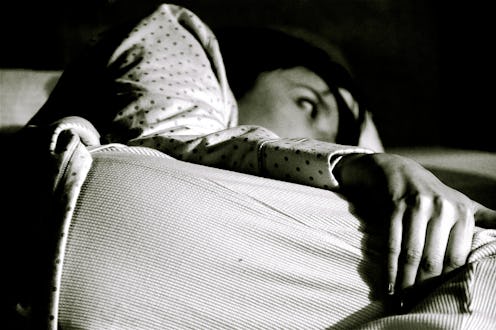Life
9 Sneaky Things That Cause Insomnia

Is there anything more maddening than lying in bed at 4 AM, sleepy and yet wide awake, watching the minutes tick by as you think, “I am going to be So. Completely. Exhausted. Tomorrow.” The CDC estimates that nearly 10 percent of Americans struggle with chronic insomnia; many more have trouble sleeping at least on occasion. Insomnia occurs for a lot of different reasons, some of which are harder to resolve than others. Major culprits include stress, depression, anxiety, and a variety of medical conditions. These issues are difficult (though not impossible) to fix, possibly requiring medical intervention and significant lifestyle changes. But not all sleep problems are so challenging to combat. Some are, in fact, caused by little things you do every day that you might not even realize influence sleep. You may be able to get the rest you need simply by making a few small changes to your schedule or your sleeping and eating habits.
If you’re having insomnia chronically, to the point that it’s interfering with your work and daily life, it’s a good idea to visit your doctor. He or she may be able to identify underlying causes of your sleeplessness and help you to resolve them. But until then, keep reading to see if you’re guilty of these insomnia-causing behaviors:
Using electronics at night.
Light has a major impact on our circadian rhythms (the internal “body clocks” that tell us when we should be asleep and awake). Our bodies naturally associate light with waking and darkness with sleeping — and even seemingly insignificant light, like that which glows from phones and tablets, can make the body think it’s time to be awake. If you’re having trouble getting to or staying asleep, try limiting your cell phone and tablet use in the hours before bed.
Changing your routines.
For better or worse, we are creatures of habit. Changing your daily routine — by working late or traveling, for example — can mess with the natural rhythms of your body and make sleep hard to find. Try to stick to a regular sleep schedule. Going to bed at the same time every night may not be exciting, but it will be restful.
Taking certain medications — Even OTC ones.
Many medications can have an adverse affect on sleep, even ones that you can buy over the counter. Prescription medications that can cause insomnia include those used to treat heart conditions, asthma, depression, and ADHD, among others. Over-the-counter meds to watch out for include those for treating cold and allergies (In my own case, I’ve learned that Sudafed, a common OTC decongestant, keeps me up at night.), as well as painkillers, as some brands contain caffeine (Caffeine has been shown to make painkillers more effective in some instances). If you think that your medicine is making you sleepless, talk to your doctor. He or she may be able to recommend a different medication or adjust your dosage in a way that will allow you to get your meds without sacrificing sleep.
Consuming caffeine.
It will surprise absolutely no one to learn that caffeine has a detrimental effect on sleep. There is no consensus about when in the day you should stop drinking coffee in order to ensure a good night’s rest, but a 2013 study found that caffeine consumed even six hours before bed had a negative impact on sleep, costing sleepers more than an hour of sleep per night. In Psychology Today, clinical psychologist and sleep expert Michael J. Breus recommends cutting off the caffeine every day by 2 PM.
Or booze.
Alcohol is a sedative, so it may seem counterintuitive that it can also cause insomnia. However, although alcohol may make it easier to fall asleep, staying asleep is another matter. According to the NIH, there are two phases to sleep — slow wave sleep (SWS) and rapid eye movement (REM) — and alcohol has been shown to disrupt the second phase. The effects of alcohol on sleep are far reaching; NIH cites a study that found that moderate amounts of alcohol imbibed six hours before bed could still have detrimental effects on sleep. So, as painful as this may be to consider, if you’re having chronic sleeplessness, you may want to lay off of happy hour for a while.
Or nicotine.
As if you needed another reason to give up smoking: Nicotine is a stimulant, and it can, therefore, keep you awake at night. Cigarettes can also kill you, so … why are you smoking again? Just stop.
Napping.
Studies have shown that short naps can be a great way to recharge in the middle of the day (especially after a sleepless night), but they're not for everyone. According to the Sleep Foundation, napping can actually exacerbate insomnia for some people. You may have to do some experimenting on yourself to see if napping gets you through the day or robs you of sleep at night.
Keeping your room too hot.
Our body temperatures naturally lower when we are asleep. Trying to sleep in a room that’s too warm can interfere with this internal temperature shift and cause wakefulness. Sleep experts recommend keeping your bedroom temp at about 65 degrees at night.
Eating the wrong foods.
A small snack before bedtime may actually help you sleep, but you have to be careful to eat the right things. Dairy products, nuts, and bananas all contain tryptophan, an amino acid that aids sleep. Carbs can also increase the amount of tryptophan in your system, so a bowl of cereal or cheese and crackers are good pre-bedtime options. Try to avoid food with high levels of protein and spicy or heavy foods before bed, as they are difficult to digest.
Sweet dreams, darlings!
Images: Alyssa L. Miller/Flickr; Pixabay; Giphy (1, 2, 3, 4, 5)